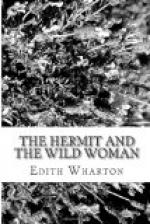IV
WITHIN three months two events had set the studio building talking. Stanwell had painted a full-length portrait of Mrs. Archer Millington, and Caspar Arran had received an order to execute his group in marble.
The name of the sculptor’s patron had not been divulged. The order came through Shepson, who explained that an American customer living abroad, having seen a photograph of the group in one of the papers, had at once cabled home to secure it. He intended to bestow it on a public building in America, and not wishing to advertise his munificence, had preferred that even the sculptor should remain ignorant of his name. The group bought by an enlightened compatriot for the adornment of a civic building in his native land! There could hardly be a more complete vindication of unappreciated genius, and Caspar made the most of the argument. He was not exultant, he was sublimely magnanimous. He had always said that he could afford to await the Verdict of Posterity, and his unknown patron’s act clearly shadowed forth that impressive decision. Happily it also found expression in a cheque which it would have taken more philosophy to await. The group was paid for in advance, and Kate’s joy in her brother’s recognition was deliciously mingled with the thrill of ordering him some new clothes, and coaxing him out to dine succulently at a neighbouring restaurant. Caspar flourished insufferably on this regime: he began to strike the attitude of the recognized Great Master, who gives advice and encouragement to the struggling neophyte. He held himself up as an example of the reward of disinterestedness, of the triumph of the artist who clings obstinately to his convictions.
“A man must believe in his star—look at Napoleon! It’s the dogged trust in one’s convictions that tells—it always ends by forcing the public into line. Only be sure you make no concessions—don’t give in to any of their humbug! An artist who lis- tens to the critics is ruined—they never have any use for the poor devils who do what they tell them to. Run after fame and she’ll keep you running, but stay in your own corner and do your own work, and by George, sir, she’ll come crawling up to you and ask to have her likeness done!”




